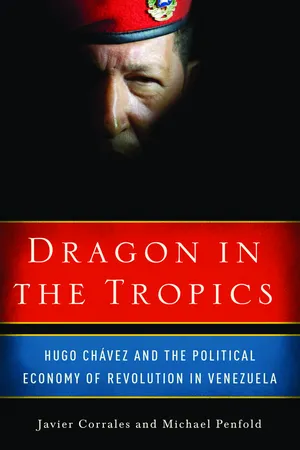
Dragon in the Tropics
Hugo Chavez and the Political Economy of Revolution in Venezuela
- 195 pages
- English
- PDF
- Available on iOS & Android
Dragon in the Tropics
Hugo Chavez and the Political Economy of Revolution in Venezuela
About This Book
Since he was first elected in 1999, Venezuelan President Hugo Chávez Frías has reshaped a frail but nonetheless pluralistic democracy into a semi-authoritarian regime—an outcome achieved with spectacularly high oil income and widespread electoral support. This eye-opening book illuminates one of the most sweeping and unexpected political transformations in contemporary Latin America.
Based on more than fifteen years' experience in researching and writing about Venezuela, Javier Corrales and Michael Penfold have crafted a comprehensive account of how the Chávez regime has revamped the nation, with a particular focus on its political transformation. Throughout, they take issue with conventional explanations. First, they argue persuasively that liberal democracy as an institution was not to blame for the rise of chavismo. Second, they assert that the nation's economic ailments were not caused by neoliberalism. Instead they blame other factors, including a dependence on oil, which caused macroeconomic volatility; political party fragmentation, which triggered infighting; government mismanagement of the banking crisis, which led to more centralization of power; and the Asian crisis of 1997, which devastated Venezuela's economy at the same time that Chávez ran for president.
It is perhaps on the role of oil that the authors take greatest issue with prevailing opinion. They do not dispute that dependence on oil can generate political and economic distortions—the "resource curse" or "paradox of plenty" arguments—but they counter that oil alone fails to explain Chávez's rise. Instead they single out a weak framework of checks and balances that allowed the executive branch to extract oil rents and distribute them to the populace. The real culprit behind Chávez's success, they write, was the asymmetry of political power.
Frequently asked questions
Information
Table of contents
- Front Cover
- Copyright Information
- Table of Contents
- Acknowledgments
- Introduction: The Chavez Revolution in Perspective
- Power Grabbing and the Rise of a Hybrid Regime in Venezuela, 1999-2009
- Economic Policy and the Oil Honey Pot
- Institutional Resource Curse: Seizing Political Control of PDVSA
- Venezuela's New Foreign Policy: Soft-Balancing and Social-Power Diplomacy
- Conclusion: Hybrid Regimes and Populism in Venezuela and Beyond
- Notes
- Index
- Back Cover